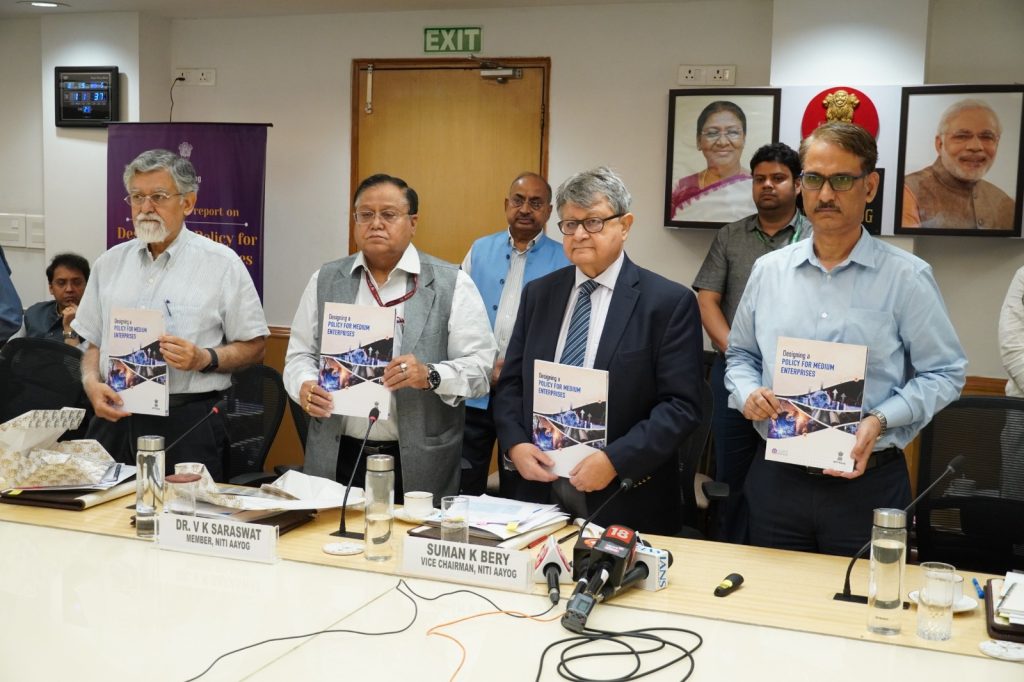Blog

Mumbai: NITI Aayog in a recent report titled ‘Designing a Policy for Medium Enterprises’ outlined a strategic roadmap to harness the untapped potential of medium-sized businesses as key drivers of India’s economic growth. The report, launched by Shri Suman Bery, Vice Chairman of NITI Aayog, in the presence of Dr. V.K. Saraswat and Dr. Arvind Virmani, Members of NITI Aayog, underscores the significant yet underutilised role of medium enterprises in the country’s industrial landscape.
Despite contributing nearly 40% of micro, small and medium enterprises (MSME) exports, medium enterprises form only 0.3% of the registered MSME sector, which itself accounts for approximately 29% of India’s gross domestic product (GDP), 40% of exports, and more than 60% of employment. This structural imbalance, where 97% of MSMEs are micro enterprises and only 2.7% are small enterprises, has limited the ability of medium-sized businesses to scale, innovate, and compete globally.
The report identifies several critical challenges hindering the growth of medium enterprises, including restricted access to customised financial products, limited technological adoption, insufficient research and development (R&D) support, inadequate sector-specific testing infrastructure, and misalignment between training programmes and business needs. To overcome these barriers, NITI Aayog has proposed a comprehensive policy framework focusing on six priority areas.
Among its key recommendations is the introduction of tailored financial solutions, including a working capital financing scheme linked to enterprise turnover, a ₹5 crore credit card facility at market rates, and streamlined fund disbursal mechanisms through retail banks. Technology integration is also emphasised, with plans to upgrade existing Technology Centers into India SME 4.0 Competence Centers designed to accelerate the adoption of advanced industrial solutions. The report further calls for the establishment of a dedicated R&D cell within the Ministry of MSME, leveraging the Self-Reliant India Fund for cluster-based projects of national importance.
In addition, the framework advocates for the creation of sector-focused testing and certification facilities to ease compliance burdens and improve product quality. Recognising the need for specialised skill development, the report recommends aligning training programmes with enterprise-specific requirements and incorporating medium enterprise-centric modules into Entrepreneurship and Skill Development Programmes (ESDPs). To enhance accessibility, a dedicated sub-portal within the Udyam platform is proposed, offering scheme discovery tools, compliance guidance, and artificial intelligence-driven assistance.
NITI Aayog stresses that empowering medium enterprises through inclusive policy design and collaborative governance is essential to unlocking their full potential. With strategic interventions across finance, technology, infrastructure, skilling, and digital access, medium enterprises are poised to emerge as vital engines of innovation, employment generation, and export growth. This transformation is crucial for India’s long-term industrial competitiveness and aligns with the broader vision of Viksit Bharat @2047.
Key Highlights
- Medium enterprises are the future large enterprises and the drivers of Viksit Bharat @2047
- The MSME sector contributes 29% to India’s GDP and employs over 60% of the workforce
- Medium enterprises, though only 0.3% of MSMEs, contribute 40% of MSME exports, showcasing immense untapped potential
- Focus on tailored financial tools, Technology Integration and Industry 4.0, Cluster-Based Testing Facilities, R&D, Skill Development, and a Centralised Digital Portal
(Write to us at editorial@bombaychamber.com)








